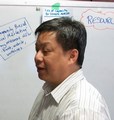Kim Stephens receives Bridge Building Award at 2010 Annual BCWWA Conference

Bringing passion and energy to everything he does, the ability of Kim Stephens to build relationships and partnerships with broad water stakeholders has resulted in a positive change to how practitioners understand the relationship between land-use and the true value of water. He specializes in public policy and integration of perspectives as they relate to urban watershed planning and application of decision support systems, and has had a leadership role in a series of Provincial initiatives in British Columbia related to water sustainability, rainwater management, green infrastructure, and smart development.
CAVI draws attention to need for integrated watershed management in Water Act Modernization Submission

“The WAM Discussion Paper appears to miss the opportunity for an integrated watershed management approach, rather focusing on water management and allocation. CAVI’s experience suggests that the integration of land use and water management at the regional or local level is germane to successfully reforming the Water Act,’ wrote John Finnie.
Living Water Smart: Doing Business Differently in British Columbia

“Since streams and rivers run across jurisdictional boundaries, effective stewardship requires a common set of management principles, regardless of the land jurisdiction or ownership. Development and resource use must consciously consider the effects on stream health and make sure the long-term and life-cycle costs of land use decisions avoid unforeseen future ecological and economic costs,” stated Barry Penner.
Metro Vancouver Board adopts comprehensive and holistic strategy for managing liquid discharges and rainwater resources

Two years in the making, the Integrated Plan establishes the framework for moving beyond regulatory compliance to transitioning Metro Vancouver to an approach that achieves the Sustainable Region Vision. “Think about it – the Reference Panel has influenced the waste committee, the finance committee and the way we make decisions overall. It is great,” reflected West Vancouver Mayor Pam Goldsmith-Jones. “The community benefits when there is collaboration and a true partnership between local government staff and community members in a working group.”
Financing strategy takes shape for implementing replacement sewage treatment plants in Metro Vancouver

Metro Vancouver is faced with a $1.4 billion financing decision on HOW to proceed with replacement of the existing Lions Gate and Iona Island treatment plants that serve the North Shore and Vancouver sewerage sreas, respectively. Complete Lions Gate by 2020 and Iona Island as soon as is reasonably possible after that. “This approach gives Metro Vancouver the flexibility to go faster, but does not strap us in if the senior governments do not come to the table with financial support. In the absence of a financial guarantee, this approach puts the ball in our court with respect to timing,” stated Port Coquitlam Mayor Greg Moore.
Metro Vancouver Reference Panel informs Finance Committee deliberations on HOW to pay for two replacement sewage treatment plants

The Lions Gate and Iona Island treatment plants have each been in service for approximately 50 years. Both have exceeded their useful lives. Both are high risk facilities with attendant environmental and legal risks for Metro Vancouver. “The overall impact of constructing both treatment plants by 2020 is comparatively small. The incremental difference in the annual financing cost of one versus two plants is not that much. The biggest hit is the first one,” stated Mayor Malcolm Brodie of Richmond.
BC Hydro Power Smart initiates ‘A Conservation Dialogue – Creating a Community of Practice’

“BC Hydro Power Smart recognizes the need for collaboration among organizations and individuals within the province,” emphasized Jeff Chiu, Manager, Community Network of Power Smart Specialists, in his remarks to the group. “As such, we have coordinated efforts with the Climate Action Secretariat’s office to build this provincial community network that can and will support regional based activities.”
Convening for Action in Maple Ridge: Understanding why RAINwater management is important

“We needed a way for all the departments to hear the same information at the same time; and we needed to know what is most relevant. The most efficient way to satisfy our information needs was to gather as a group and have a conversation with Kim Stephens,” stated Rodney Stott.
100-YEAR ACTION PLAN FOR BOWKER CREEK WATERSHED RESTORATION: Bowker Creek Forum advances a ‘regional team approach’ to achieving water sustainability in the Georgia Basin

Located in the urbanized heartland of the Capital Regional District, the Bowker Creek watershed is shared by the City of Victoria, City of Oak Bay, and District of Saanich. “A desired outcome in holding the Bowker Creek Forum was to share information about successful approaches, so that they can be replicated in other jurisdictions. The forum was a chance for regional organizations, businesses and community members to learn more about and celebrate the accomplishments of the Bowker Creek Initiative,” stated Tanis Gower.
SYMPOSIUM ON PLANNING FOR RESILIENCE: “Collaborate and ‘design with nature’ to adapt to climate change,” urged Kim Stephens in a panel presentation on ‘Uncertain Water Supplies’ at the University of British Columbia (March 2010)

The School of Community and Regional Planning at UBC (SCARP) held its 2nd Annual Symposium in March 2010. The theme was Planning for Resilience. In his presentation, Kim Stephens responded to these questions: What potential crises is British Columbia facing presently or in the future regarding water? What is the state of current Provincial policies? What changes are needed and what lessons can we learn from other areas facing similar challenges?

